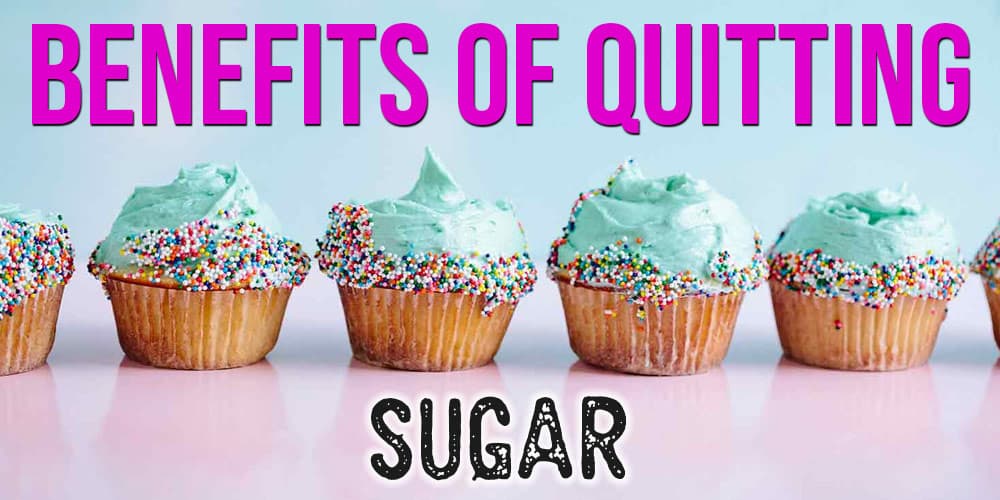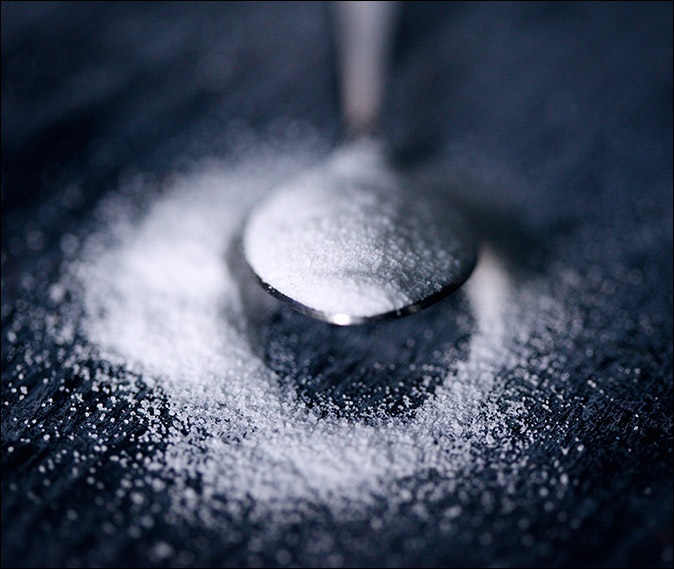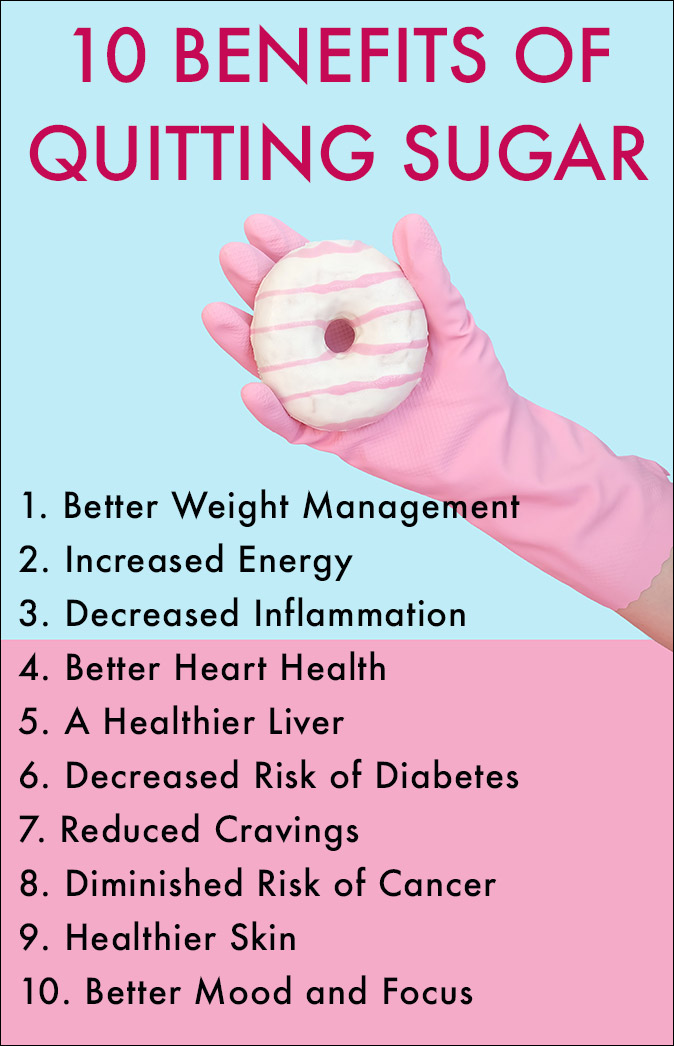
As delicious as a sweet treat can be from time to time, most of us don’t realize the amount of added sugar we’re consuming every single day. If we understood the health benefits of quitting sugar and a no sugar diet we would look at those treats differently.
The recommended amount of daily sugar consumption for adults is 12 teaspoons or less. However, the Centers for Disease Control and Prevention (CDC) reports most adults are taking in 17 teaspoons or more of added sugar on a daily basis.
There is a direct link between sugar and diseases like obesity, type 2 diabetes, heart disease, and – surprise, surprise – addiction. Sugar is addictive and it’s making us sicker.
One of the biggest reasons we’re consuming so much sugar is because it is literally in everything we eat. Even foodstuffs, like salad dressing, yogurt, ketchup, bread, pastas, and many other products contain sugar.
Whether we consider these foods healthy or not, at the very least they are not seen as desserts, so they are not perceived as foods that contain added sugars.
To make matters more pressing, the truth is that sugar shares many of the same addictive properties as illicit drugs like heroin, cocaine, opioid prescription painkillers, and benzodiazepines.

Similarities Between Sugar and Addictive Drugs
It can be just as difficult to go on a no sugar diet as it is to stop using many addictive drugs for some of the following reasons…
- A surge of the “feel good” neurotransmitter dopamine is released in the brain with both addictive drugs and sugar
- In brain scans, sugar lights up the same areas of the brain as do habit forming or addictive drugs
- Physical cravings for both substances are powerful and can cause people to binge on sugar or go on, for example, a drug or alcohol bender
- Too much sugar, just like with alcohol and drugs, can lead to poor physical and mental health
- Giving up sugar cold-turkey, just like other drugs, can cause extremely uncomfortable withdrawal symptoms
These symptoms should sound familiar to anyone with an addictive personality who has been addicted to drugs just as much as those who find it difficult to stop eating sugar.
The cravings alone keep people coming back for more drugs or alcohol, and the same can be said for sugary foods too.
Trying to overcome any form of addiction can be a struggle, and sugar is no different. The benefits of not eating sugar, or severely cutting back on it will take vigilance simply because of the number of products it’s in.
But with a bit of discipline, and learning how to form new habits, the rewards and benefits of cutting out sugar and living a sugar-free lifestyle can be quite substantial.
Here are 10 Healthy Benefits of Quitting Sugar and a No Sugar Diet
1. Better Weight Management From Quitting Sugar
I can eat all the sugar I want and not gain a pound, said nobody ever. We all know desserts are a guilty pleasure, and no matter how good we feel when eating them, the guilt will creep in later when we get on the scale.
Weight gain occurs because regular sugar consumption increases insulin levels, which affects our metabolism and turns those sugary calories right into belly-fat.
Giving up sugar helps our bodies burn fat for fuel and keeps our weight down or stable. Trading sugar-loaded foods with healthier alternatives like fruits for dessert make it easier to cut back.
2. Increased Energy
A sugary snack might perk us up, but only for a moment because as it leaves the system, there’s a blood sugar crash, leaving us more lethargic and less focused.
Some recreational drugs do the same thing, and that feel good moment is fleeting. Once the initial rush of euphoria passes, it drags us down and we feel worse than before we started.
Instead, rely on slow-burning carbs and protein, like an apple or banana with peanut butter. This provides a sweet treat without the refined sugar and offers the body fuel for more energy without the crash. This works great 20 minutes or so before working out too.

3. Decreased Inflammation
Sugar increases inflammation in the body’s soft-tissue, which leads to aches and pains in the joints, a poor immune system, and is known to be a factor in depression.
Inflammation in the body isn’t something that we can outwardly see, and because it’s invisible, we never know when it becomes an issue. Sure, we feel its affects, but we simply think having pain or being sick is a normal part of life.
The benefits of quitting sugar or significantly cutting back on it can do wonders for decreasing inflammation and improve the way we feel now and over time as we age.
4. Better Heart Health
With weight gain and inflammation comes high blood pressure issues, as well as coronary heart disease, all of which lead to a greater risk for heart attacks.
Sugar can also contribute to increasing bad cholesterol and decreasing good cholesterol.
Something as straightforward as ditching sugary soda is a good first step for reducing these risks, and removing other sugary foods will take it a step further.
Heart health is important for all the systems in the body, so taking care of it is worth finding better foods to eat with less sugar.
5. A Healthier Liver
Too much refined sugar can lead to a fatty buildup in the liver, which then causes liver disease. In some cases, experts believe too much sugar is as hard on the liver as too much alcohol.
Here again is another comparison of sugar to an addictive substance like alcohol. We never think of sugar as a drug, until we see how both can have an unhealthy impact on the body.
6. Decreased Risk of Diabetes
Weight gain is a key factor in the development of type 2 diabetes. Excess fat makes the body resistant to insulin and eventually the pancreas can’t produce enough to meet demand.
Avoiding sugar, exercising, and managing weight will definitely lower the risk for diabetes.
Fortunately for those who may have developed type 2 diabetes, lifestyle changes like exercising, losing weight, and giving up sugar can reverse many of the effects and some people might return to pre-diabetic health levels.
7. Reduced Cravings
The rush of dopamine we get from eating sugar reinforces the desire for more of it. Giving up sugar can help return the body’s dopamine levels to normal and reduce physical cravings.
Ironically, cravings are part of the brain’s reward center and the euphoric feelings we get are difficult to overcome, until we realize the real reward comes after we give up sugar and the cravings go away.
8. Diminished Risk of Cancer
There’s plenty of evidence that quitting sugar can lower the risk of cancer partly because sugar leads to weight gain and body fat, which increases the risk of cancer.
At least one study of people with a lot of refined sugar in their diets showed an increase in pancreatic cancer.
Alcohol has recently shown a connection to various types of cancer, and the mechanisms and reasons are thought to be similar to sugar.
9. Healthier Skin
Over time, sugar in the body creates an unhealthy connection to proteins that are responsible for producing collagen that helps keep our skin elastic, youthful, and free of wrinkles. When that happens we lose the benefits of collagen.
When too much sugar leads to inflammation, it can cause the skin to be more prone to acne and other unhealthy conditions. This is probably why we were told as teens that candy bars cause pimples. It’s not quite that simple or direct, but they are somewhat related.
10. Better Mood and Mental Focus
The sum total of all the benefits of cutting out sugar from our diet is better overall mental health combined with restful and restorative sleep.
Reducing inflammation in the brain and body, combined with better sleep leads to an improved ability to concentrate and think clearly.
These same reasons have shown that people experience a better mood each day with a lower risk of dealing with depression.

Benefits of a No Sugar Diet and Cutting Out Sugar For Recovery
The health benefits of quitting sugar and sticking to that no sugar diet outlined above make it easy to see why having a goal to cut back our intake is important. But how does it impact those in recovery from drugs or alcohol?
It can be tricky and even more difficult for people overcoming a substance addiction to quit sugar, especially all at once, cold turkey. In fact, a better option might be to taper off slowly instead of all at once.
This is even more important for those who rely on sweets as a coping mechanism for depression, stress or anxiety.
Because too much sugar can cause depression, this might sound counter-productive, and it is in the long term. So it’s recommended to ease into it and slowly give up sugar over time by making it a goal for the future.
Quitting drugs or alcohol is much more physically and psychologically grueling than quitting sugar. To maintain the focus on sobriety, many people might need some added help from a crutch like ice cream or other favorite sugary snacks.
Sugar can trigger similar reward signals from dopamine in the brain as many drugs and provide an emotional safe place that is healthier than relapse. If this works, set a clear intention to only use it temporarily until cutting back further is more manageable.
No Sugar Diet Food List
In the meantime, introduce healthier food swaps like:
- vegetables
- fruits
- lean meats
- poultry
- tofu
- fish
- whole unprocessed grains
- legumes
- nuts
- seeds
In due time, making the switch away from processed foods loaded with sugar will become much easier.
Good nutrition is vitally necessary for those in recovery and setting a goal to eat healthy foods and achieving that no sugar diet is a worthwhile goal. Incorporating a regular exercise plan will contribute to feeling good, and when we feel better, we also eat better.
Related Posts
- How to Increase Serotonin Naturally - Serotonin Foods and Tips
Learning how to how to increase serotonin is beneficial because it’s a natural mood booster…
- Addictive Personality Disorder
The last decade has seen an increase in reported cases of substance abuse. Behavioral addictions…
